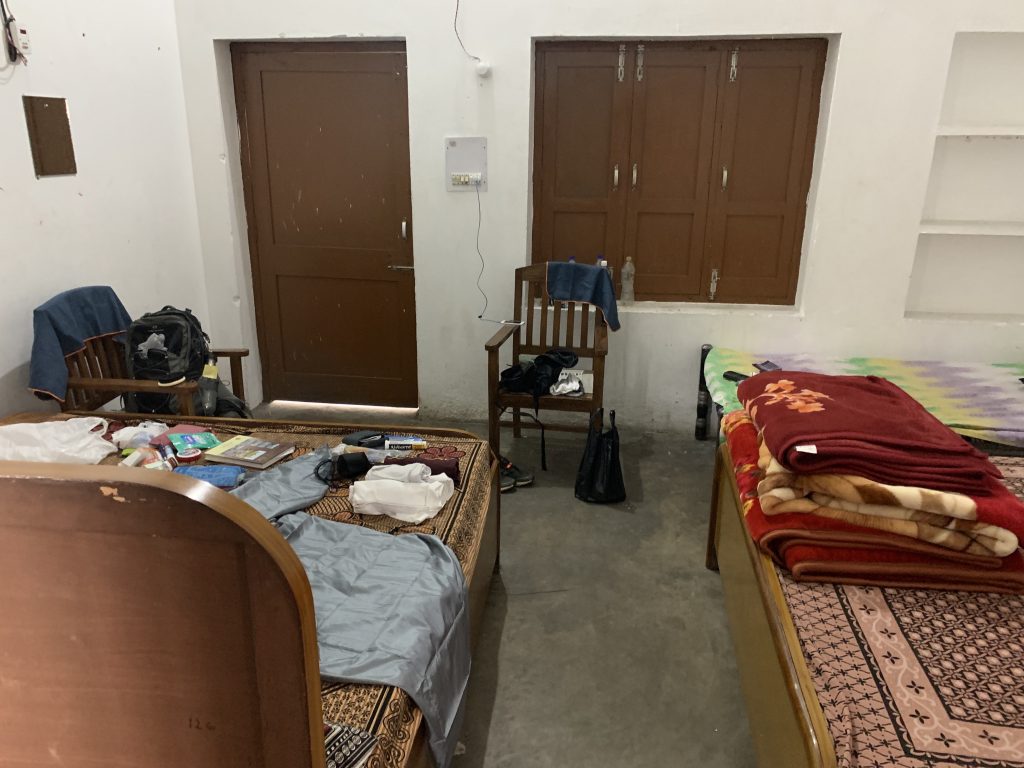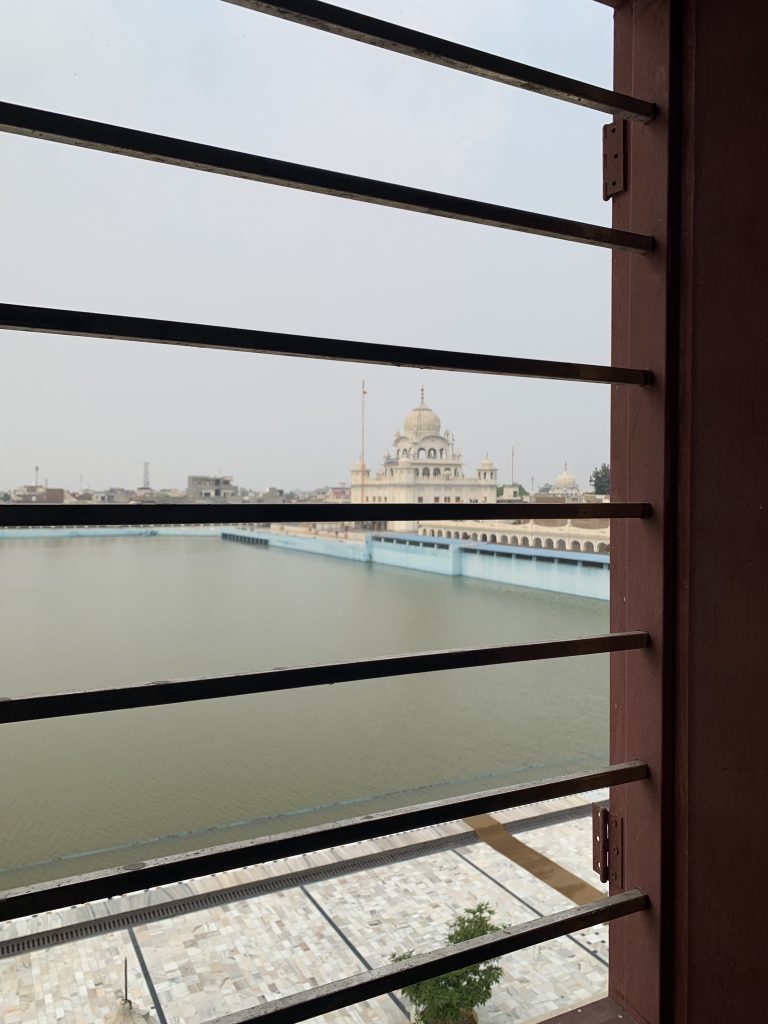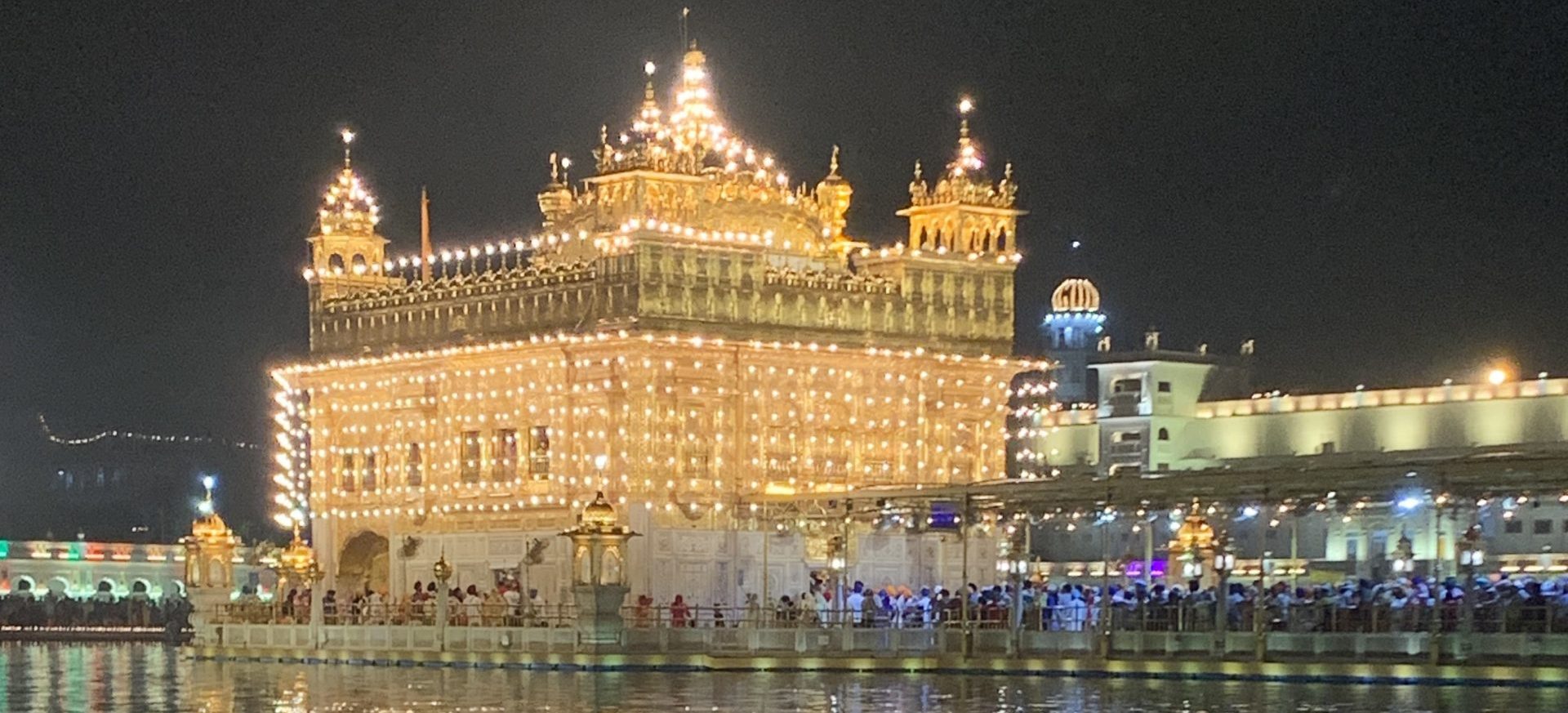“So, where did you stay?” one of my friends asked in a chat about the trip. When I left Houston, I had only booked the hotel in Amritsar. Hotel Le Golden is conveniently located at the end of a small alley across from the Sri Akal Takht Sahib entrance of the Harmandir Sahib complex. After a short exchange of WhatsApp messages with Mr. Raj at the hotel, I had a confirmed booking for two nights. Upon reaching, I had a place to shower and freshen up before going to pay my respects at the holiest of Sikh shrines. And Ravinder had the assurance that I was not just going to sleep on the street. Beyond that, the plan at large was to find a place to stay wherever I was (or expected to be) at dusk. And, for the most part, it worked. I came close to sleeping on a padded mat (gadda, ਗੱਦਾ) under a fan in a corridor, but the mosquitoes convinced me not to partake in that experience. There were no advance hotel bookings because I had an open-ended, evolving itinerary. On just the second day in Amritsar, I extended my stay by one more night so that I could visit the Gobindgarh Fort and other historical gurdwaras in Amritsar city.
It was about 8 pm on Sunday when the autorickshaw (tuk-tuk) pulled up at the North entrance of Sri Darbar Sahib Gurdwara in Tarn Taran. It was a quiet intersection. A shop selling refreshments and snacks was open. Looking around, I could see no neon signs beckoning a weary traveler to a hotel. I deposited my backpack in the cloak room (gathri ghar, ਗਠੜੀ ਘਰ) and shoes on the shoe rack (jora ghar, ਜੋੜਾ ਘਰ), and proceeded to walk around the sarovar (water tank) to pay my respects at the Darbar Sahib, located on the southeast corner of the sarovar. The hustle and bustle of the bazaar outside the main entrance had died down at this hour. The few remaining shopkeepers were wrapping up for the night. Upon asking around, I found out that there were no hotels in the vicinity. When the shopkeeper I was talking to found out that my belongings were at the North entrance, he suggested that I check if rooms were available at the gurdwara guest house (saran, ਸਰਾਂ or nivas), located in the intersection where the autorickshaw had dropped me off. Later, at the time of writing this post, I would find out that the intersection is called Saran Wala Chowk (Guest House Crossing).
The saran office was open. There was a big ledger on the small table. The Sikh gentleman seated at the table was busy with some paperwork and motioned me to sit while he continued tallying receipts. After the customary greeting of “Waheguru Ji Ka Khalsa, Waheguru Ji Ki Fateh,” the exchange that followed was repeated on many future occasions, with minor variations.
Me: Is there a room available for tonight?
Him: For how many people?
Me: One. Just me.
Him: Where have you come from?
Me: Mohali
I always say, “I am from Mohali.” That is my local address where my parents live. He proceeds to ask my name, my father’s name, address, and mobile number. After all the information is entered, he asks me to sign against my entry. He then tells me that the rate for the night is 500 rupees and check-out time is 12 noon. After collecting the cash payment, he writes me a receipt and gives me the room key. He waves me off, in the general direction of the room.
The three-story saran is built around a central plaza. The room doors open into the plaza. There is a small green space in the center around which two-wheelers and cars are parked. The air-conditioned room is furnished with two large beds, a cot, and two chairs. The bathroom is equipped with an Indian-style toilet that I have not used in over two decades!


From this point on, the saran became my top choice for accommodation in a new location. Staying in the saran was safe and economical. The added benefit was that a saran was always close to a Gurdwara I was visiting. In Sri Muktsar Sahib, my room overlooked the sarovar. In the morning, I awoke to melodious keertan.
As can be expected, there were speed bumps along the way. In Baba Bakala, the staff was very insistent that single travelers could not rent out rooms. They offered to put me up in a dormitory hall which was setup with mattresses on the floor. At Gurdwara Patalpuri Sahib in Kiratpur Sahib, I found myself in a similar situation. Except this time, it was mattress in a corridor under a fan. I passed on both.
Twice, I found myself looking for a room on a busy Saturday night. In both instances, the unmanned reception desk was surrounded by a crowd of devotees from out of town hoping to get a room for their families for the night. There was no signage indicating when (if, at all) anyone would be back at the desk and whether there were any vacancies. The first time was in Sri Anandpur Sahib, one of the five Takhts (Seats) of Sikhism. I was exhausted. I had just come back from Gurdwara Patalpuri Sahib 12 kilometers away where I had not been able to get a room. It was the same story at three different sarans in Sri Anandpur Sahib – closed office and no indication of whether rooms were available. A helpful tea stall owner called a local hotel for me but when I arrived there, the room was no longer available. But, seeing that I was a lone traveler, they offered me a room (with attached bathroom) in their private residence!
In Khadur Sahib, I stayed with the family of my long time Houstonian friend. After five or six nights in different towns, I always returned to the familiar comfort my parents’ home to recharge and plan the next part of the trip.
Acknowledgements: Sargun for proof-reading
First published
Last updated
